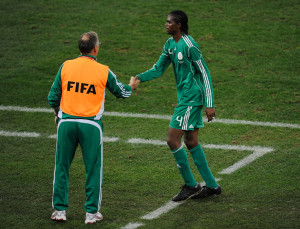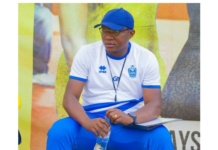It is 20 years since one of Africa’s most recognisable faces made his first mark on the international stage at the FIFA U-17 World Cup Japan 1993.
In the centre of Tokyo’s Olympic Stadium, Nwankwo Kanu lifted his first piece of international silverware of what was to be a prestigious career, but also took his first steps to becoming a legend in the green ofNigeria.
Speaking to FIFA.com, the former Super Eagles forward looks back on his trip to the Far East fondly, having opened up the path to becoming his nation’s second-most capped player.
“It’s a long time ago isn’t it! I’ve got great memories of that tournament,” he said from Lagos. “Representing your country is always an honour and to go on and win the tournament was huge for all of us in the team – it helped put us on the map.
“Personally I did well, and it started me on the road to joining clubs like Ajax and the ones who followed, but without it I wouldn’t be here today. It was very important.”
The tournament began well for the former Inter Milan and Arsenal man, scoring in just the first minute ofNigeria’s opening match against Canada, on the way to scoring 14 without reply in a group that also contained Argentina and Australia. “That goal relaxed me, and it’s very important to score early to settle the team,” Kanu recalled. “From there the team were able to gain more confidence and just grow from there.”
The tournament culminated in a West African grudge match, pitting the Golden Eaglets against Ghana, making a huge game for the then-youngsters that little bit more important. “Of course it was a big game, particularly with it coming against Ghana. They are clearly one of our major rivals,” he admitted, “but while we are brothers there is always this desire to be the better than one another.”
Goals from Wilson Oruma and Peter Anosike secured a 2-1 win, and the fact it was against the Black Starlets made it all the sweeter for Kanu and his team-mates. “Because it was between the two of us it was even bigger. It meant that when we walked away with victory it was almost a double win!”
Talent production line
It was Nigeria’s second title of three so far at the FIFA U-17 World Cup, as well as claiming a further three runners-up medals, making them the most successful team in the tournament’s history. “In Nigeria we are blessed with talent, and we have a lot of young players coming through,” he said. “Any opportunity given to them, they want to prove something.”
The veteran forward believes there’s no reason why the latest iteration cannot take up the mantle and continue their world-leading performances in UAE. “I’ve watched them play. I’ve seen how they perform and since then I’ve believed they could be a champion, so let’s hope they can go do that, as they have a good team.”
Kanu’s exploits in Japan led him to pulling off arguably his finest achievement in the green of Nigeria, when the team claimed gold again at the 1996 Olympics in Atlanta, USA. The tournament even began memorably for him, smiling broadly as he recalls the opening ceremony. “I remember when I was there, being asked to be an Olympic torch bearer, it was something special. For us to go there, becoming the first African team to win it, beating three some huge teams in the process, is something special.”
Those three sides Nigeria dispatched in the knockout stages were Mexico, Brazil and Argentina, but it was the victory over then-world champions – boasting the likes of Ronaldo, Rivaldo and Roberto Carlos – in the semi-final that will live long in Kanu’s memory. “At the time everybody knows they were the best in the world, with players turning out for teams like Barcelona, so we were certainly a little scared of them,” he recalled. “But it was a semi-final and not something you could really predict, while we had good players in our team too, like Jay-Jay [Okocha] and [Daniel] Amokachi.”
The writing looked to be on the wall when they were 3-1 down with 12 minutes to go. However, Victor Ikpeba’s goal gave them hope, but Kanu fired the game into extra time, before going one better and hitting a stunning golden goal for a 4-3 win. “We drew level in the 90th minute and at that time we knew we were back in the game and thought ‘whatever happens we can make it through to penalties’,” he said.
“However, I had a bit of a magic moment in extra time, where I just dribbled the ball and shot to score the golden goal. For us, at that moment, we knew we were going to win the Olympics.”
The final was equally dramatic, with a last-minute Emmanuel Amunike goal securing a 3-2 win over Argentina, but fuelled by the previous round, the Super Eagles were never in doubt of victory. “After beating Brazil – the dream team – who we felt had the best players in the tournament, we were full of confidence in the final. For us, that was the final. Against Argentina we thought, ‘whatever happens, we are flying – they can’t stop us’.”
It is a triumph that Kanu feels he and his team-mates will be remembered for, having broken the European and South American hegemony at the Olympics. “To say we were there, picking up a gold medal, is really something. No one expected us to do it and it’s something that Nigeria, and possibly the world, won’t forget.”
The world stage
Two African player of the year titles followed, but Kanu was always disappointed the success did not transfer to the CAF Africa Cup of Nations or the FIFA World Cup™. The Super Eagles came close in the former, finishing runners-up to Cameroon in 2000 in front of a home crowd in Lagos.
While the last-16 at France 1998 was as far as they got, appearing at the global showpiece in 2002 and 2010 is still something he remembers fondly. “Everyone wants to represent their country at the World Cup and there are three goals you want to achieve there. The first is to participate, the second is to make your mark, and the third is to win it,” Kanu explained. “If you achieve any of these, you feel like you have done well in your football career.”
It was also to be the stage where Kanu would make his international swansong, bowing out in his side’s 2-2 draw with Korea Republic at South Africa 2010. He now spends his time focussing on the Kanu Heart Foundation, which he set-up in 2000, which aims to help children and young adults with heart defects – an ailment he overcame in 1996.









